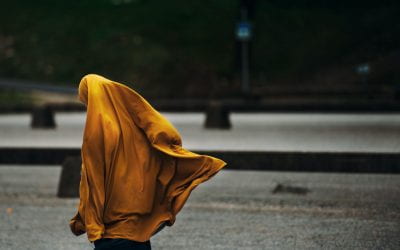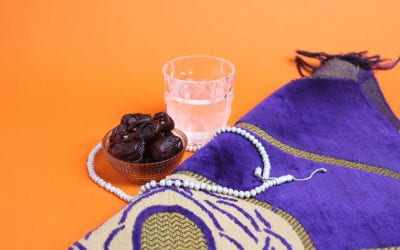Written by Salih Yucel
Latest Articles:
“And Death Shall Be No More”: How an Encounter with a Dying Man Led Me to God
My experience of a patient’s death sparked a search for the meaning of life. I came to view death, not as the end, but as a completion of the hardships and duties of this life, the gateway to paradise.
I remember vividly in high school the headache associated with trying to grapple the meaning of John Donne’s Sonnet X (known best for its opening line, “Death be not proud”), cursing the teacher under my breath for choosing such a difficult poem to study. Slowly we dissected it down until it gnawed under my skin, fixing itself to my subconsciousness, ever present, if not known.

One short sleep past, we wake eternally
And death shall be no more; Death, thou shalt die.
The words came back to me one nightshift, shortly after starting work. “Black Wednesday” had been and gone, where new doctors join the workforce on the first Wednesday in August, and the more senior junior doctors — the house officers and the registrars — also move onto their new jobs at the next rank. As a new doctor I was like a deer in the headlights; or perhaps more like a newly born fawn wobbly on its legs.
It was about 2 am and the mists had rolled in, casting an eerie glow from the carpark lights through the single glazing and into the cold corridors. I was covering at least seven wards — upwards of 150 patients — effectively by myself, a month into the job.
Earlier that night I had been called to a man in his 60s. He had end-stage prostate cancer and was, quite frankly, fed up. He told me in no uncertain terms that he wished to be left alone and he wanted to die — he had no fight left in him and was very tired. He didn’t care about getting more fluids through the night, and, because I couldn’t guarantee that we wouldn’t fluid overload him, the nurse and I decided that no more should be written up. Perhaps the morning team would have more luck.
I was lost in my thoughts looking out into the darkness when the bleep went off calling me to a ward. It was the same ward as the man with prostate cancer. Opening the door, I was greeted by the same nurse, hurrying me into the man’s room. He sat, bolt upright, staring straight ahead, panting for air.
“I don’t want to die”, he said. Sometimes even now I shut my eyes and see the scene seared on the back of my eyelids. “I have a family. Save me. I don’t want to die.”
I carried my Oxford Handbook of Clinical Medicine everywhere with me, a safety blanket of sorts. I already had the page I needed marked — there had been a similar case the night before — and the nurse was fantastic. I wrote down all the orders, the nurse began to draw them up. I called X-ray. I called my senior — they were busy, but wouldn’t be too long.
Through his oxygen mask, he continued to beg in the half-light of the ward’s glow.
“I don’t want to die. Save me. I have a family. I’m too young to die.” The fear in his eyes bore into me. I didn’t know what more I could do, so went to phone my senior again, to tell her that things didn’t look good and I really needed some help.
While I was on the phone, the nurse came out of his room, shaking his head. The man was dead. “I’ll come anyway”, the senior said, kindly taking the load of speaking to the family from me. She told them how we had done all that we could, and, just like his wishes, we hadn’t tried to resuscitate him to continue his fight against terminal cancer.
But I couldn’t shake the fear in his eyes. It sent aftershocks into my soul that led to the questioning of assumed truths and changed the course of my life.
“People turn to God in hospitals”, my mum remarked when I told her that the Islamic faith aligned better with my beliefs than my Anglican upbringing. An off-hand comment that undermined, or more likely failed to recognise, the trauma that I was trying to heal. It’s true that people do find their faith in hospitals, at the end of their lives, and in the difficult situations in life. It’s even commented on in the Qur’an.
I had sat in my car the morning after that shift, blaming myself for not doing more, despite the fact that nothing would have changed the outcome. In those moments, a faith in God that had been neglected for many, many years was the only thing to give solace to the memory of those fearful eyes. At least for him death was no more — death had died.
And so, in that moment, the words of John Donne found their home and entwined with the notion of fate and predetermination: qadr. I finally understood what Donne was trying to say. I reminded myself repeatedly that nothing I could have done would have led to a different outcome, that it was always going to be this way — qadr.
I read the Qur’an over the following year, feeling as though the message was already within me, feeling as though the words had been taken out of me and put on the pages in front of me. Muslims call it fitra — the innate belief in the oneness of God. To me, I just found that an unlettered man from the Arabian Peninsula recited words that resonated with me 1,400 years later in a way that nothing else ever had. I was scared because I knew about the proliferation of Islamophobia after 9/11, but knew that there was no way I could avoid accepting Islam — and faith — into my life. I understood that deep in my heart this was always the path that I was destined to take. I could see occasional glimmers of the threads of a divine plan that had been woven over many years, laying foundations until the final spark of the gentleman’s death. Qadr.
For many years my beliefs of death were best articulated by a verse inscribed into two Himyarite tombs in Yemen:
The two Lords of Himyar in yonder tombs are laid,
Their bodies in the earth have rott’d, their bones decayed;
By the hand of death they fell, by it were destroyed,
Death, that which on earth none can its sting avoid.
Lo, at the time of birth their bodies of dust were made.
And to dust return, when in the earth they’re laid.
Just as it was common in pre-Islamic Arabia, a nihilistic view of death is not too infrequent nowadays: that death is final and that there is no afterlife. Interestingly, a theory called “Terror Management Theory” posits that those without a belief in the afterlife need to find fulfillment and leave a legacy within their own lifetimes in order to feel a sense of peace about death. However, those who believe in life after death do not have this pressure to reach these markers of success within their lifetimes due to their belief that reward comes in the afterlife.
As I read further into theology, my preconceived ideas about success started to shift, slowly transforming from outward to inward markers of success. I felt the shift between the two groups described in the “Terror Management Theory”: I no longer found myself wanting my “dream career” at any cost, but instead preferred inner peace and calm. The hoops I needed to jump through to get to my end goals and were no longer glittering markers of success, but black holes through which I had to sell my soul. My goals morphed from climbing to the top of the career ladder at the youngest age possible, to finding satisfaction in the smaller things in life — the way a blossom catches the evening sunshine in spring, a particularly elegant sentence, a small act of kindness.
There’s a rather interesting finding in Daud Batchelor’s research into the happiness of Islamic nations. According to his Islamic Index of Well-Being, countries and territories that are not necessarily the wealthiest or enjoy the best living conditions were found to be among the happiest. While interesting, this finding should not really be surprising at all because it follows scriptural guidance from all the major world’s faiths — wealth does not and cannot buy happiness. In the words of Ash-Shafi’i, an Islamic legal scholar from the ninth century:
I know that contentment is the core of richness, and I adhered to it, so I never stood at anybody’s door, or begged anyone. Consequently, I became rich without a dirham, passing by people as if I were a king.
Happiness, therefore, rests with being content with what we have — whether that be little or lots, whether we are in good health or bad, or whether our lives are long or tragically short. This contentment is not just for ourselves, but also for our friends and loved ones, as well as for the strangers who touch our lives. Perhaps, then, the root of happiness is knowing that our lives are of a fixed, determined length, and being content with what we have before that time comes.
Belief that reward comes in the afterlife means that our present lives here become a path, with the decisions that we make affecting whether our afterlife is a reward or a punishment. Death comes to be viewed, not the final end of life, as on the Himyarite tombs, but as a completion of the hardships and duties and a release from the suffocation of this worldly life into the everlasting gardens of paradise.
Death therefore morphs from a nightmare into just a transitionary phase to the afterlife through which we all pass — death is just a moment, after which death is no more. Death becomes powerless. Indeed, the aforementioned “Terror Management Theory” found that beliefs in the afterlife result in increased self-esteem, reduced anxiety, as well as reduced response to pain. This understanding of death therefore not only makes death more meaningful, but also can make life more pleasant.
Indeed, I increasingly found that happiness was not to be found in the consumerist trappings of our society, but that I was at my happiest when I shifted my goals away from these. Perhaps I could say that I found the path to happiness in a 1,400-year-old holy book and the musings of a legal scholar from the ninth century. It is a path that I am still navigating — a journey sparked by the death of a gentleman on a misty night in Scotland.
*This article was originally published by Rosalind Noor in The ABC Religion and Ethics on November 23 2021. To view the original article, click here.
About the Author
Dr Rosalind Noor is an ACT-based General Practitioner and Fellow of the RACGP. She received her MBBS from Imperial College, London; and completed the Masters of Surgical Sciences from the Edinburgh University. She is currently reading for her Masters in Islamic Studies and Classical Arabic from Charles Sturt University.





0 Comments